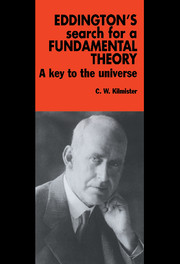5 - ‘Something has slipped through the net’
Published online by Cambridge University Press: 03 December 2009
Summary
This chapter is devoted to the one major error in MTR which I have mentioned above. Our knowledge of the external world will, it is argued there, be precisely of the form expressible by the tensor calculus. On p. 49, for example, Eddington says:
I do not think it is too extravagant to claim that the method of the tensor calculus, which presents all physical equations in a form independent of the choice of measure-code, is the only possible means of studying the conditions of the world which are at the basis of physical phenomena.
That Eddington, in common with all physicists (and most mathematicians who were interested), was so convinced was of the greatest importance on a personal level. When his error was exposed by Dirac's 1928 paper on the electron, it had a profound psychological effect. For Dirac expressed the electron equation, not in tensor form, but in terms of new entities – spinors. Since this is such a key issue for my argument, I make no apology for going into it at some length. In the course of the discussion I shall be able to take up the question, left from Chapter 4, of what exactly a tensor is.
The principle of relativity
In order to understand Eddington's conviction and also to see why it is false, it is necessary first to look more closely at the so-called ‘principle of relativity’ which is mentioned by both Einstein and Eddington but without saying exactly what the principle is.
- Type
- Chapter
- Information
- Eddington's Search for a Fundamental TheoryA Key to the Universe, pp. 65 - 78Publisher: Cambridge University PressPrint publication year: 1995



